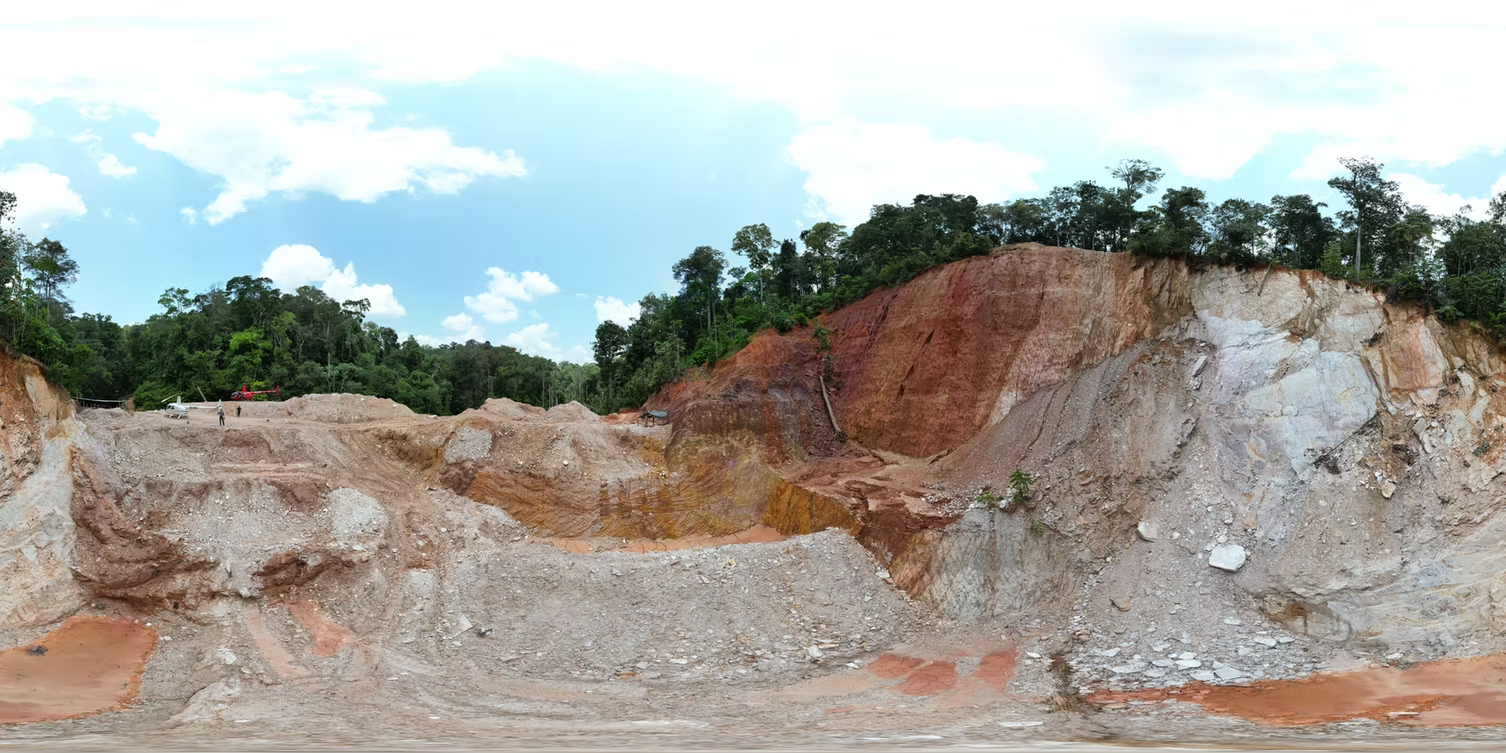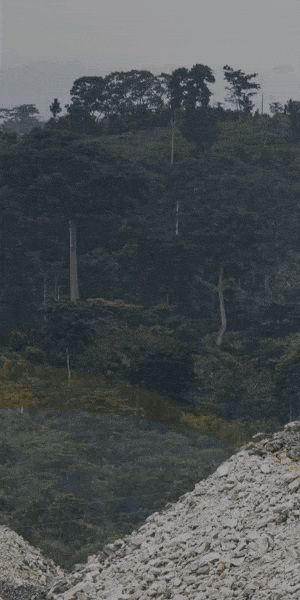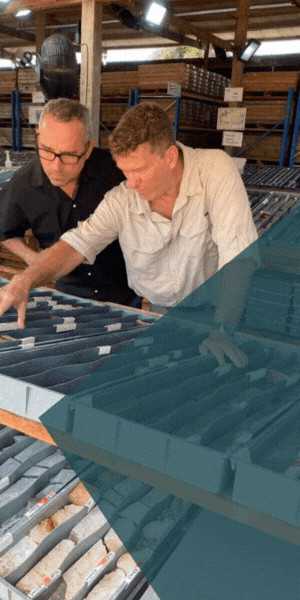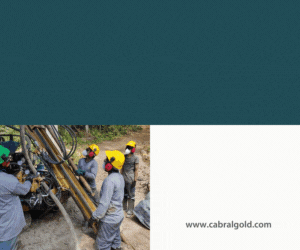Greenheart Gold: Discovery Pipeline Builds With Three Drill Programs Ahead

Greenheart Gold applies proven Oko West team expertise with $35M cash to systematic multi-project Suriname exploration: Majorodam drilling now, Igab Jan '26, Tosso Creek Q1 '26.
- The company maintains approximately $35 million in cash, providing financial flexibility to systematically evaluate multiple projects without requiring frequent capital raises or dilution.
- Greenheart follows a rapid project evaluation strategy, quickly advancing promising targets while dropping projects that don't meet economic thresholds, having already relinquished underperforming Guyana projects.
- Currently drilling at Majorodam in Suriname with 1,500 meters planned by year-end, with additional programs scheduled for Igab (January 2026) and Tosso Creek (Q1 2026), targeting multiple discovery opportunities.
- Operating in Guyana and Suriname provides permitting efficiency, established infrastructure near existing operations, and the ability to move from discovery to production in approximately seven years, as demonstrated at Oko West.
In an environment where gold prices have reached record levels, exploration companies face mounting pressure to deliver quick results. Greenheart Gold (TSXV:GHRT), however, is taking a more measured approach - one informed by years of successful discovery work in the Guiana Shield. Led by President and CEO Justin van der Toorn, the company's executive team previously built Reunion Gold and made the significant Oko West discovery, a 6-million-ounce deposit now being developed into production. In a recent discussion, Justin outlined Greenheart's strategy of systematic project evaluation, disciplined capital allocation, and leveraging deep regional expertise to generate shareholder value through new discoveries in Guyana and Suriname.
Building on a Foundation of Discovery Success
Greenheart Gold's management team brings substantial credibility to the exploration space through their track record at Reunion Gold.
"We built that company over many years and we ended up making a discovery at Oko West which is about six million ounces and that company we merged with G-Mining Ventures,"
The Oko West project represents a compelling case study in efficient mine development within the jurisdiction. From initial systematic exploration work beginning in early 2020 through first drill holes at year-end 2020, environmental assessments completed by mid-2024, and projected production in 2027, the project demonstrates a seven-year discovery-to-production timeline - remarkably fast by global standards.
Following the merger with G Mining Ventures, the Greenheart team recognised their competitive advantage lay specifically in early-stage exploration.
"We felt that our strengths is on the exploration side. So we took the executive team, we took most of the geology team as well and we basically set up a new company Greenheart Gold."
A Different Financial Model for Junior Exploration
Perhaps Greenheart's most distinguishing characteristic is its capital position - unusual for a junior exploration company. The company currently maintains approximately $35 million in cash reserves.
"It's unusual for a junior explorer. It's a luxury as a geologist to be able to have that ability to work very systematically without having to worry about the fact that one project might fail."
This capital cushion enables a fundamentally different operational approach than most exploration companies employ. Rather than being tied to a single project and forced to raise capital repeatedly with the attendant dilution, Greenheart can maintain exploration momentum across multiple projects simultaneously.
Rapid Project Evaluation and Portfolio Optimization
Central to Greenheart's strategy is the concept of systematic project turnover - quickly advancing promising opportunities while dropping those that don't meet threshold requirements.
"We wanted to build an exploration company that's going to rapidly turn over projects and get us quickly to those decision points. Are we going to drill? If the answer's yes, we'll drill it."
The company has already demonstrated this discipline by relinquishing certain Guyana projects. One project failed to generate attractive drilling targets and was relinquished outright. Another underwent drilling that intersected high-grade quartz veins but lacked the scale necessary for economic development given its remote interior location.
This approach recognises that discovery thresholds vary significantly based on location and infrastructure access. Projects near existing operations - such as Greenheart's Majorodam property south of Igab, located 30 kilometers south of Newmont's Merian mine. could be valuable with smaller discoveries given potential processing synergies. Interior projects, however, require larger deposits to justify standalone development capital expenditures.
"At the end of the day, you don't want us to spend money on projects unless they're really worth spending money on. If we spend money on bringing a rig to site and drilling somewhere, we do that because we think there's potential for this to turn into an economic deposit."
Interview with Justin van der Toorn, CEO of Greenheart Gold
Current Drilling Activity: Majorodam Project Development
Greenheart's most advanced project, Majorodam in Suriname, is currently undergoing an active drilling campaign with 1,500 meters planned by year-end. The project has evolved through multiple exploration phases, beginning with reverse circulation (RC) drilling that generated encouraging results, followed by diamond drilling to establish structural controls on mineralization.
"We had the initial RC results. Very encouraging, but obviously what you don't get with the RC is any kind of structural information."
The subsequent diamond drilling program focused on oriented core to measure structures and develop a geological model. While the diamond drilling didn't replicate the exact RC grades, it served its intended purpose.
"For us that's fine, it really was more about creating the structural model and understanding what is controlling where we think the mineralization sits."
The geological understanding gained has revealed complexity compared to the relatively straightforward Oko West deposit. Multiple deformation events create interference patterns and shallow-dipping zones of higher porosity where mineralization concentrates - geometries that require specifically targeted drilling rather than bulk orientation approaches.
The upcoming drilling phase will test these refined geological concepts with a program designed to intersect the interpreted shallow-dipping mineralization zones more effectively.
Near-Term Catalysts: Multiple Projects Advancing
Beyond Majorodam, Greenheart has established a pipeline of drill-ready targets that should generate news flow through the first half of 2026. The Igab project will see drilling commence in January following extensive groundwork preparation.
"We're looking to bring another rig to our Igab project early in January. That's to follow up on the five different targets that we have there."
Preparatory work has included soil geochemistry infill, trenching, and channel sampling to define the geochemical footprint and establish structural controls on mineralization before committing drill capital.
The Tosso Creek project represents the portfolio's earliest-stage opportunity, with drilling anticipated in late Q1 2026. An excavator was recently transported across Suriname's central reservoir via pontoon barge to begin trenching and road cut development. This progression creates potential for drill results from all three Suriname projects over approximately six months, providing multiple discovery opportunities without concentration risk in any single target.
Operational Expertise in Challenging Terrain
Effective exploration in the Guiana Shield requires specialised capabilities that Greenheart has developed through years of regional work. The interior jungle environment presents logistical challenges including wet season conditions, remote access, and limited infrastructure - factors that can quickly inflate costs or delay programs for unprepared operators.
Greenheart's all-in drilling costs run approximately $300 per meter USD, including exploration work, logistics, supplies, camp infrastructure, and personnel, a figure that reflects operational efficiency despite challenging conditions. The team times heavy infrastructure work like road construction for dry seasons while maintaining drilling capacity through wet periods, provided proper advance preparation has occurred.
The company takes a minimalist approach to camp infrastructure in early-stage projects, maintaining flexibility to relocate if geological results dictate.
"Until we're really confirmed on doing a more expensive drill program, there's no need to really build out a camp."
Core facilities necessary for logging, geotechnical work, cutting, and sampling are established, but accommodations remain "cheap and cheerful" to maximise capital directed into the ground.
Jurisdictional Advantages: Permitting and Development Timeline
Operating in Guyana and Suriname provides significant advantages relative to many global mining jurisdictions, particularly regarding permitting efficiency and development timelines. The contrast with more bureaucratic jurisdictions is stark - major companies in some regions face extended delays with equipment standing idle awaiting permits.
"We do everything the correct way and with respect for the environment and the places we're working, but there isn't a long bureaucratic process to do that fortunately."
This efficiency compounds throughout the discovery-to-production cycle. The Oko West example - seven years from discovery to production demonstrates what's achievable.
The jurisdictional advantage extends to workforce availability and community relationships. While Guyana's growing oil industry has absorbed some university graduates, exploration work still attracts geologists preferring fieldwork over offshore platforms. Greenheart also employs local community members for exploration activities, integrating community outreach with operational benefits.
Disciplined Approach in a Strong Gold Price Environment
Despite strong gold market conditions creating investor demand for rapid results, Greenheart maintains its systematic approach.
"The risk in this kind of market is that there are demands for quick success. So it's very easy to say ‘we'll skip a few phases, and start doing the work early’."
The temptation to accelerate programs or reduce preparatory work can lead to suboptimal decision-making that looks questionable in hindsight. Greenheart's preference for thorough early-stage work - soil sampling, trenching, structural mapping, before committing significant drill capital reflects hard-won experience.
This methodical approach may not generate the rapid-fire news releases some investors expect in strong markets, but it optimises capital efficiency.
"As geologists the one thing you can control are the decisions you make. You can't control what's there at the end of the day. It's either there or it's not. So, as long as you make the [calculated] decisions of where to spend that money, you're on the right track."
Looking Ahead: Building a Discovery Pipeline
Greenheart's current portfolio positions the company with multiple shots on goal through 2026. Three projects in Suriname at various advancement stages provide diversification, while the company continues evaluating additional ground in both Suriname and Guyana. The strong capital position enables this multi-project approach without near-term financing pressure.
The company's institutional shareholder base appears aligned with the strategy, understanding that systematic exploration generates the highest probability of discovery success even if individual projects are dropped. The team's proven ability to make discoveries, advance them efficiently through the jurisdictional framework, and ultimately create mines provides confidence that the approach can replicate past success.
With gold prices supportive, jurisdiction-specific expertise, operational efficiency, and financial flexibility to maintain exploration momentum, Greenheart Gold has positioned itself to systematically pursue new discoveries in one of the world's premier exploration environments.
The Investment Thesis for Greenheart Gold
- Proven Management Team: Executive team discovered and advanced the 6-million-ounce Oko West deposit (now under construction for 2027 production) and brings deep Guiana Shield expertise spanning multiple successful mine discoveries
- Exceptional Capital Position: Approximately $35 million cash provides runway to systematically evaluate multiple projects, advance discoveries, and maintain exploration momentum without near-term dilution risk
- Disciplined Portfolio Strategy: Rapid project evaluation model allows quick advancement of promising targets while dropping underperforming projects, demonstrated by recent Guyana relinquishments, maximising capital efficiency
- Multiple Near-Term Catalysts: Active drilling at Majorodam (1,500m by year-end), Igab drilling starting January 2026, and Tosso Creek drilling in Q1 2026 create multiple discovery opportunities over six-month period
- Jurisdictional Advantages: Guyana and Suriname offer efficient permitting, established infrastructure, seven-year discovery-to-production timelines, and proximity to existing operations that lower discovery thresholds
- Operational Efficiency: All-in drilling costs of $300/meter USD including logistics in challenging jungle terrain demonstrate cost management and regional operational expertise
- Scalable Discovery Model: Systematic soil sampling, trenching, and structural work before committing drill capital optimises spending and increases probability of drill success
- Institutional Support: Large institutional shareholder base aligned with systematic exploration strategy and disciplined capital allocation approach
- Portfolio Optionality: Three Suriname projects at varying advancement stages plus continued ground acquisition provides diversification and reduces single-project risk concentration
Macro Thematic Analysis
The Guiana Shield represents one of the world's most prospective yet underexplored greenstone belts, offering compelling exploration potential in an environment of elevated gold prices and strong investor appetite for precious metals exposure. With gold trading near record levels, exploration companies with proven regional expertise and financial capacity to systematically evaluate multiple targets are positioned to capture significant value through new discoveries.
The jurisdiction's efficiency demonstrated by seven-year discovery-to-production timelines, provides a clear pathway from exploration success to operating mines, addressing investor concerns about capital being locked up in lengthy development cycles common in more bureaucratic jurisdictions.
"With the gold price where it is, everybody's looking for anything that can give them exposure to quick success."
Companies combining experienced management teams with substantial capital pools can methodically pursue multiple opportunities simultaneously, increasing discovery probability while maintaining financial flexibility.
TL;DR: Executive Summary
Greenheart Gold leverages proven management that discovered the 6-million-ounce Oko West deposit with $35 million in cash to systematically pursue multiple discoveries across three active Suriname projects - Majorodam (drilling now), Igab (January 2026), and Tosso Creek (Q1 2026), in a jurisdiction offering seven-year discovery-to-production timelines. The disciplined portfolio approach rapidly evaluates and drops underperforming projects while maintaining exploration momentum, positioning the company for discovery success without near-term dilution in a strong gold price environment.
FAQ's (AI Generated)
Analyst's Notes




Subscribe to Our Channel
Stay Informed



































